Leadership and Management Report: Roles, Approaches, and Operations
VerifiedAdded on 2022/12/28
|13
|3767
|70
Report
AI Summary
This report provides a comprehensive analysis of leadership and management, focusing on the roles of leaders and managers, and their application within the context of Deloitte, a multinational professional service network. The report defines and compares the characteristics of leaders and managers, examining their roles in different situational contexts, particularly in response to challenges such as the COVID-19 pandemic. It applies various leadership theories and models, including situational, systems, contingency, behavioral, and trait theories. Furthermore, the report explores key approaches to operations management, such as business process redesign, Six Sigma, Lean Manufacturing, and Just in Time management, and assesses the factors within the business environment that impact operational management and decision-making by leaders and managers. The report highlights how Deloitte utilizes these management approaches to achieve business objectives and improve efficiency.
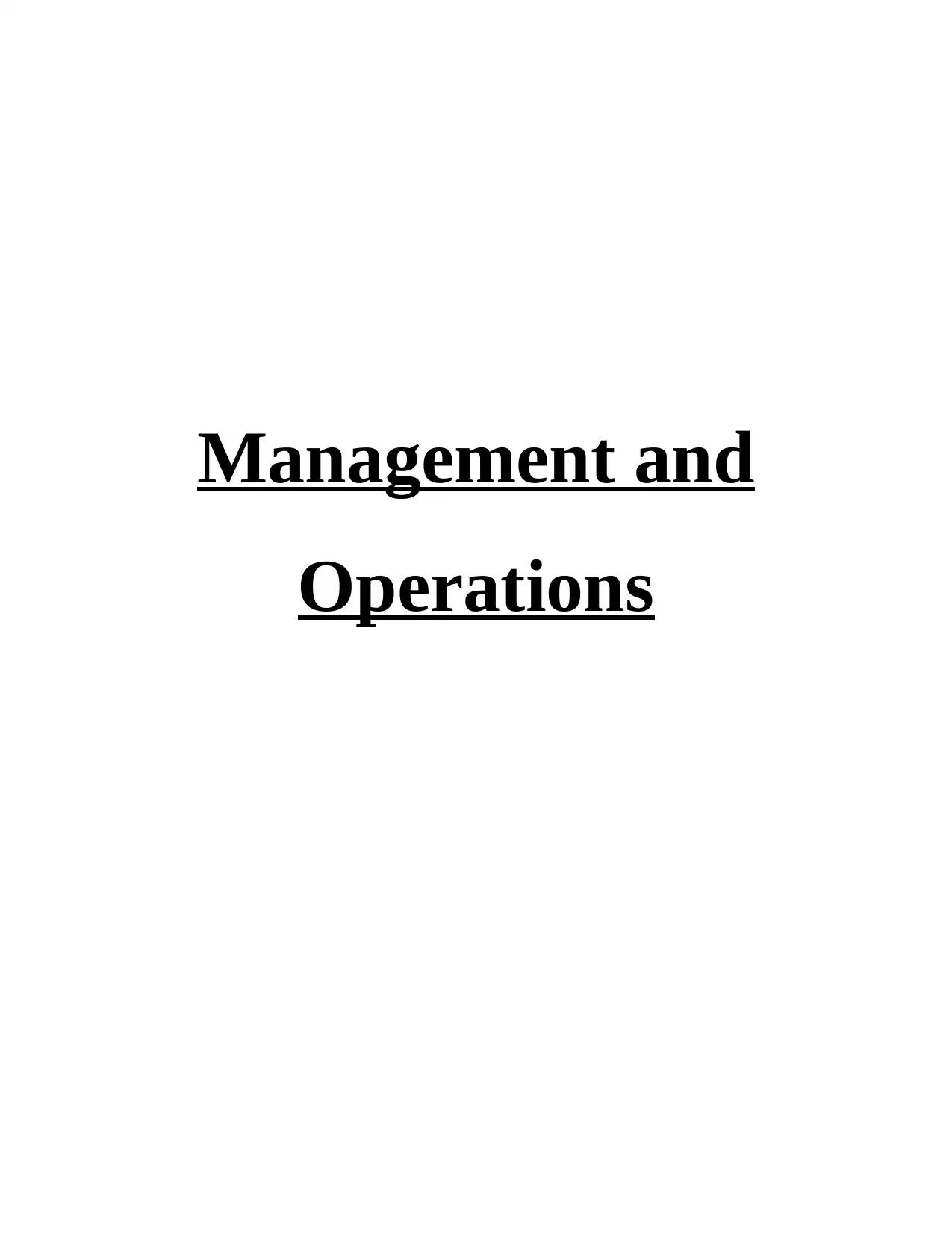
Management and
Operations
Operations
Paraphrase This Document
Need a fresh take? Get an instant paraphrase of this document with our AI Paraphraser
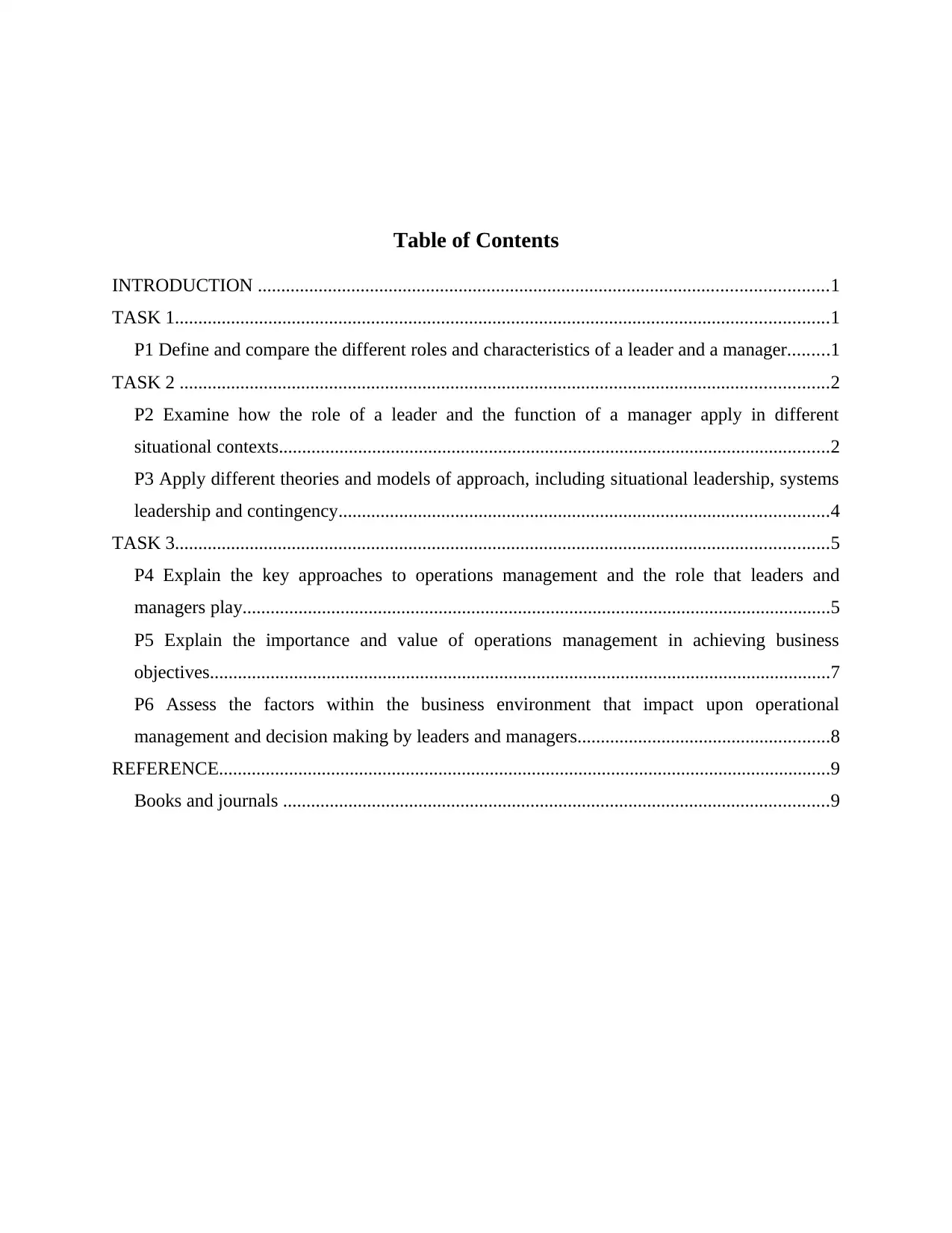
Table of Contents
INTRODUCTION ..........................................................................................................................1
TASK 1............................................................................................................................................1
P1 Define and compare the different roles and characteristics of a leader and a manager.........1
TASK 2 ...........................................................................................................................................2
P2 Examine how the role of a leader and the function of a manager apply in different
situational contexts......................................................................................................................2
P3 Apply different theories and models of approach, including situational leadership, systems
leadership and contingency.........................................................................................................4
TASK 3............................................................................................................................................5
P4 Explain the key approaches to operations management and the role that leaders and
managers play..............................................................................................................................5
P5 Explain the importance and value of operations management in achieving business
objectives.....................................................................................................................................7
P6 Assess the factors within the business environment that impact upon operational
management and decision making by leaders and managers......................................................8
REFERENCE...................................................................................................................................9
Books and journals .....................................................................................................................9
INTRODUCTION ..........................................................................................................................1
TASK 1............................................................................................................................................1
P1 Define and compare the different roles and characteristics of a leader and a manager.........1
TASK 2 ...........................................................................................................................................2
P2 Examine how the role of a leader and the function of a manager apply in different
situational contexts......................................................................................................................2
P3 Apply different theories and models of approach, including situational leadership, systems
leadership and contingency.........................................................................................................4
TASK 3............................................................................................................................................5
P4 Explain the key approaches to operations management and the role that leaders and
managers play..............................................................................................................................5
P5 Explain the importance and value of operations management in achieving business
objectives.....................................................................................................................................7
P6 Assess the factors within the business environment that impact upon operational
management and decision making by leaders and managers......................................................8
REFERENCE...................................................................................................................................9
Books and journals .....................................................................................................................9

⊘ This is a preview!⊘
Do you want full access?
Subscribe today to unlock all pages.

Trusted by 1+ million students worldwide
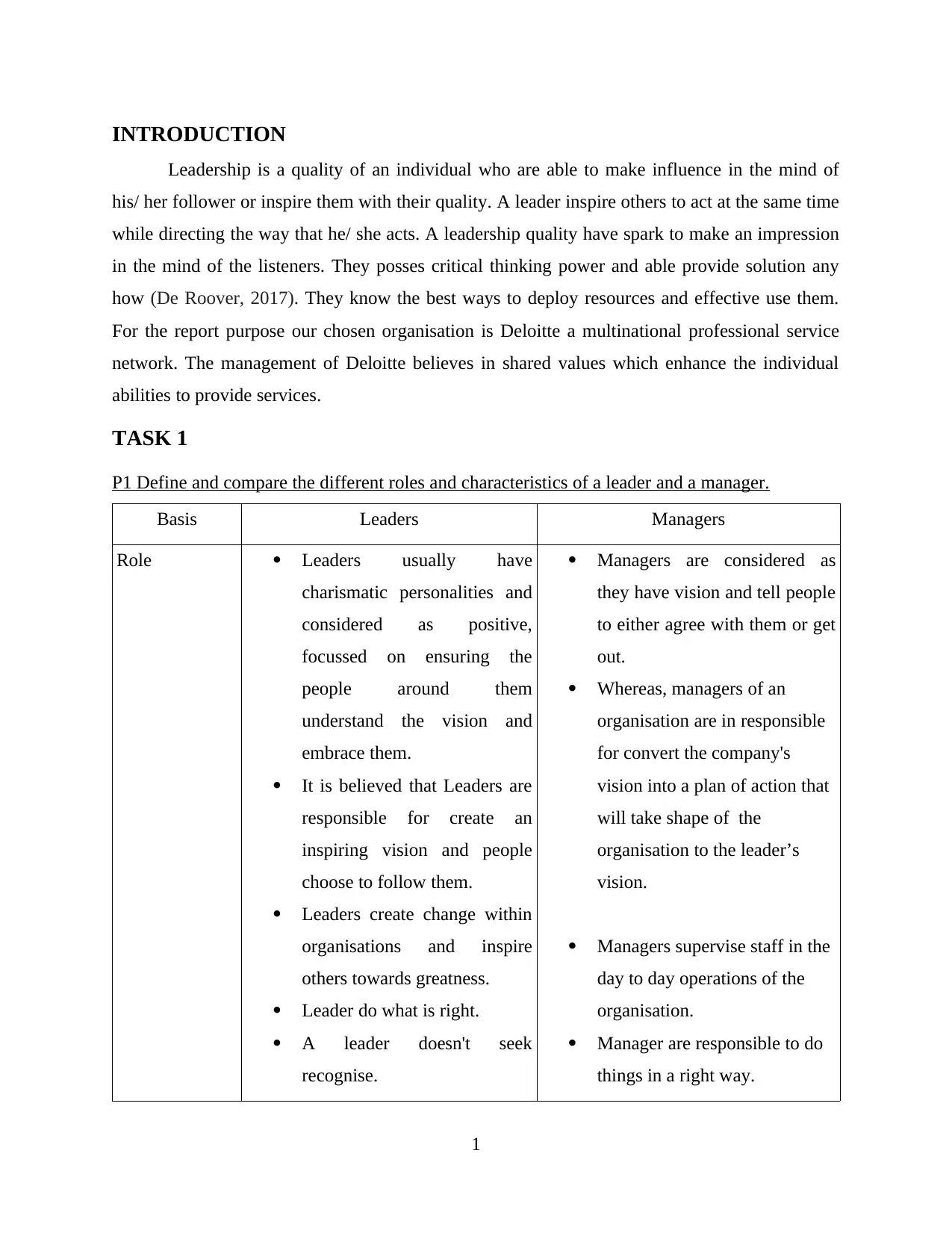
INTRODUCTION
Leadership is a quality of an individual who are able to make influence in the mind of
his/ her follower or inspire them with their quality. A leader inspire others to act at the same time
while directing the way that he/ she acts. A leadership quality have spark to make an impression
in the mind of the listeners. They posses critical thinking power and able provide solution any
how (De Roover, 2017). They know the best ways to deploy resources and effective use them.
For the report purpose our chosen organisation is Deloitte a multinational professional service
network. The management of Deloitte believes in shared values which enhance the individual
abilities to provide services.
TASK 1
P1 Define and compare the different roles and characteristics of a leader and a manager.
Basis Leaders Managers
Role Leaders usually have
charismatic personalities and
considered as positive,
focussed on ensuring the
people around them
understand the vision and
embrace them.
It is believed that Leaders are
responsible for create an
inspiring vision and people
choose to follow them.
Leaders create change within
organisations and inspire
others towards greatness.
Leader do what is right.
A leader doesn't seek
recognise.
Managers are considered as
they have vision and tell people
to either agree with them or get
out.
Whereas, managers of an
organisation are in responsible
for convert the company's
vision into a plan of action that
will take shape of the
organisation to the leader’s
vision.
Managers supervise staff in the
day to day operations of the
organisation.
Manager are responsible to do
things in a right way.
1
Leadership is a quality of an individual who are able to make influence in the mind of
his/ her follower or inspire them with their quality. A leader inspire others to act at the same time
while directing the way that he/ she acts. A leadership quality have spark to make an impression
in the mind of the listeners. They posses critical thinking power and able provide solution any
how (De Roover, 2017). They know the best ways to deploy resources and effective use them.
For the report purpose our chosen organisation is Deloitte a multinational professional service
network. The management of Deloitte believes in shared values which enhance the individual
abilities to provide services.
TASK 1
P1 Define and compare the different roles and characteristics of a leader and a manager.
Basis Leaders Managers
Role Leaders usually have
charismatic personalities and
considered as positive,
focussed on ensuring the
people around them
understand the vision and
embrace them.
It is believed that Leaders are
responsible for create an
inspiring vision and people
choose to follow them.
Leaders create change within
organisations and inspire
others towards greatness.
Leader do what is right.
A leader doesn't seek
recognise.
Managers are considered as
they have vision and tell people
to either agree with them or get
out.
Whereas, managers of an
organisation are in responsible
for convert the company's
vision into a plan of action that
will take shape of the
organisation to the leader’s
vision.
Managers supervise staff in the
day to day operations of the
organisation.
Manager are responsible to do
things in a right way.
1
Paraphrase This Document
Need a fresh take? Get an instant paraphrase of this document with our AI Paraphraser
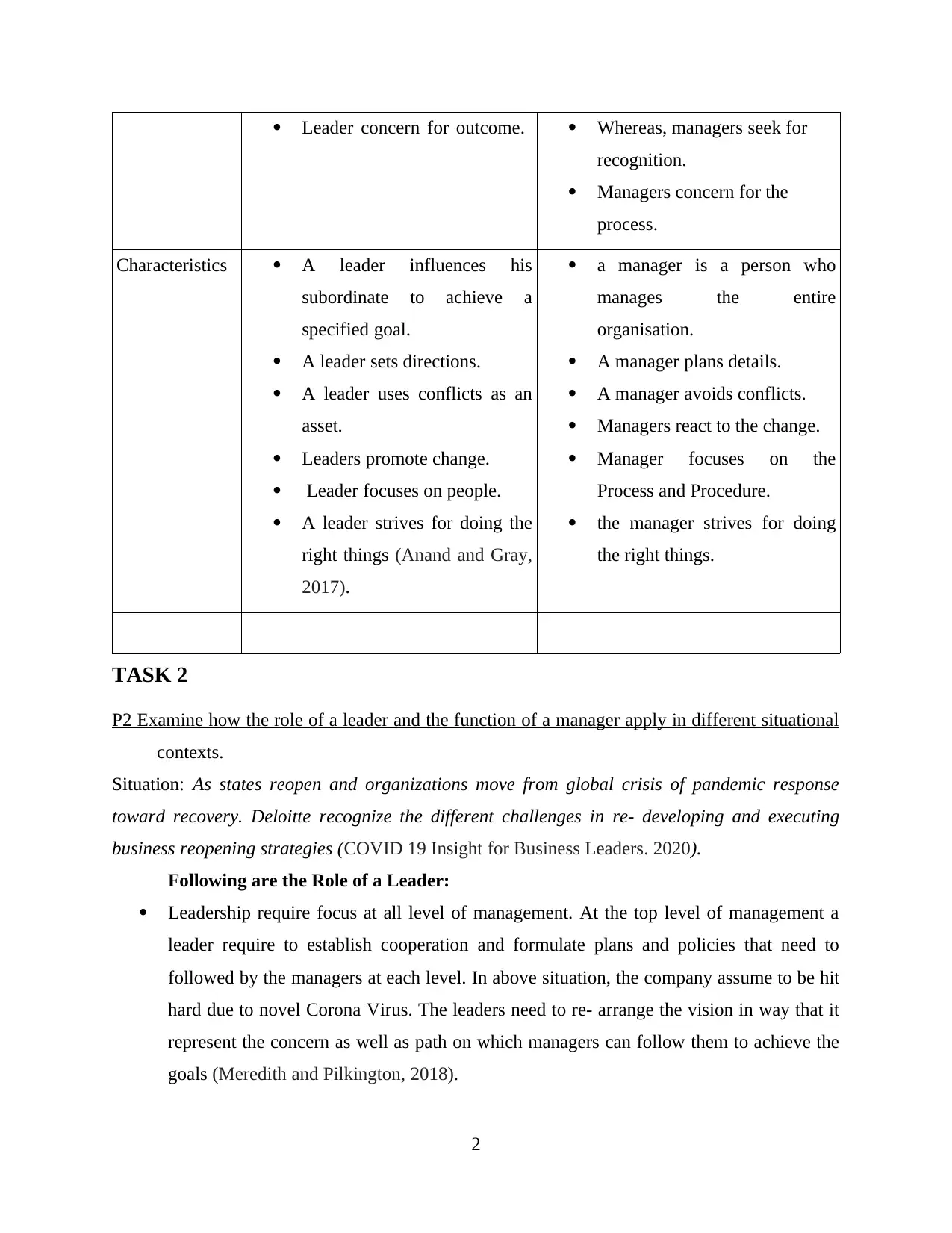
Leader concern for outcome. Whereas, managers seek for
recognition.
Managers concern for the
process.
Characteristics A leader influences his
subordinate to achieve a
specified goal.
A leader sets directions.
A leader uses conflicts as an
asset.
Leaders promote change.
Leader focuses on people.
A leader strives for doing the
right things (Anand and Gray,
2017).
a manager is a person who
manages the entire
organisation.
A manager plans details.
A manager avoids conflicts.
Managers react to the change.
Manager focuses on the
Process and Procedure.
the manager strives for doing
the right things.
TASK 2
P2 Examine how the role of a leader and the function of a manager apply in different situational
contexts.
Situation: As states reopen and organizations move from global crisis of pandemic response
toward recovery. Deloitte recognize the different challenges in re- developing and executing
business reopening strategies (COVID 19 Insight for Business Leaders. 2020).
Following are the Role of a Leader:
Leadership require focus at all level of management. At the top level of management a
leader require to establish cooperation and formulate plans and policies that need to
followed by the managers at each level. In above situation, the company assume to be hit
hard due to novel Corona Virus. The leaders need to re- arrange the vision in way that it
represent the concern as well as path on which managers can follow them to achieve the
goals (Meredith and Pilkington, 2018).
2
recognition.
Managers concern for the
process.
Characteristics A leader influences his
subordinate to achieve a
specified goal.
A leader sets directions.
A leader uses conflicts as an
asset.
Leaders promote change.
Leader focuses on people.
A leader strives for doing the
right things (Anand and Gray,
2017).
a manager is a person who
manages the entire
organisation.
A manager plans details.
A manager avoids conflicts.
Managers react to the change.
Manager focuses on the
Process and Procedure.
the manager strives for doing
the right things.
TASK 2
P2 Examine how the role of a leader and the function of a manager apply in different situational
contexts.
Situation: As states reopen and organizations move from global crisis of pandemic response
toward recovery. Deloitte recognize the different challenges in re- developing and executing
business reopening strategies (COVID 19 Insight for Business Leaders. 2020).
Following are the Role of a Leader:
Leadership require focus at all level of management. At the top level of management a
leader require to establish cooperation and formulate plans and policies that need to
followed by the managers at each level. In above situation, the company assume to be hit
hard due to novel Corona Virus. The leaders need to re- arrange the vision in way that it
represent the concern as well as path on which managers can follow them to achieve the
goals (Meredith and Pilkington, 2018).
2
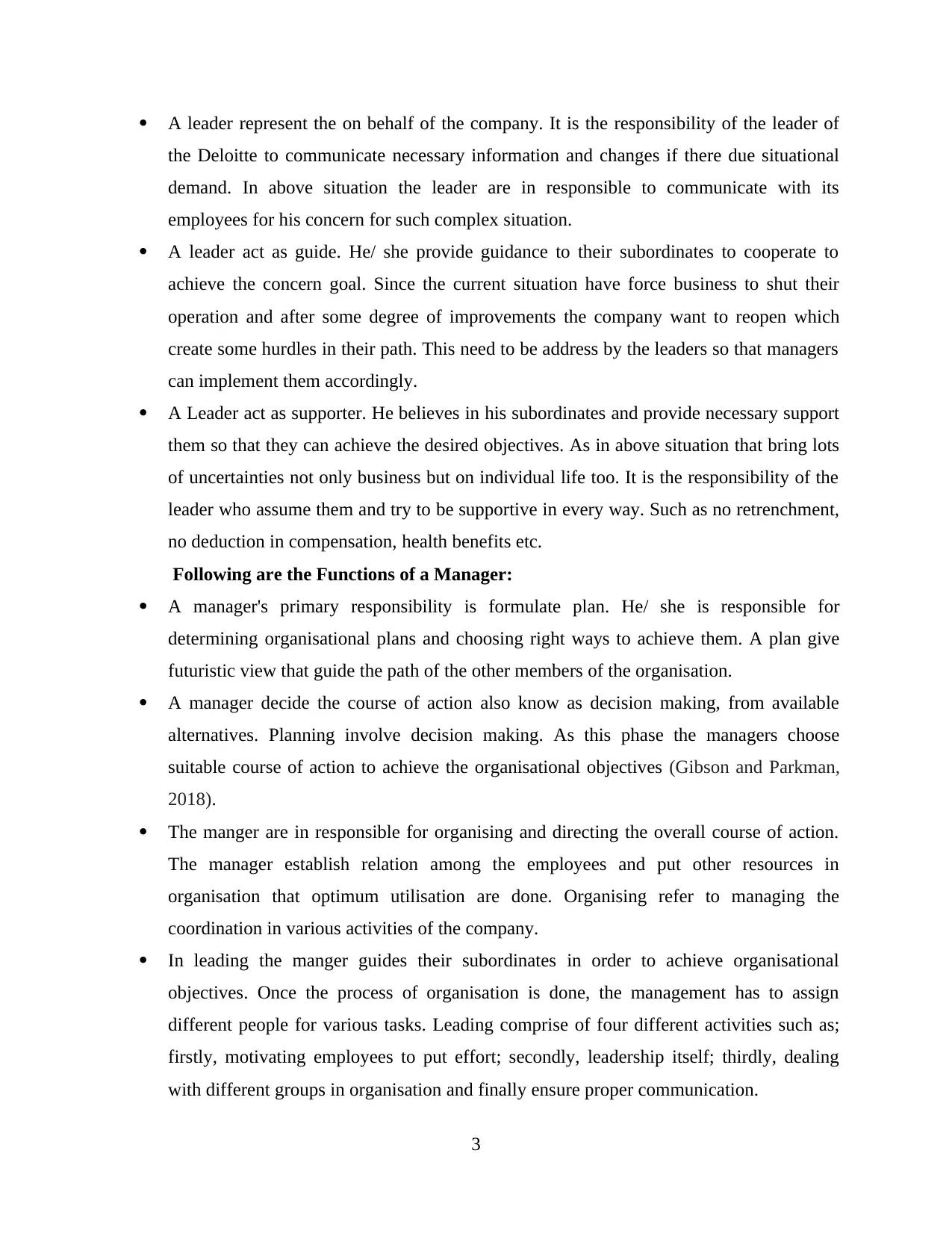
A leader represent the on behalf of the company. It is the responsibility of the leader of
the Deloitte to communicate necessary information and changes if there due situational
demand. In above situation the leader are in responsible to communicate with its
employees for his concern for such complex situation.
A leader act as guide. He/ she provide guidance to their subordinates to cooperate to
achieve the concern goal. Since the current situation have force business to shut their
operation and after some degree of improvements the company want to reopen which
create some hurdles in their path. This need to be address by the leaders so that managers
can implement them accordingly.
A Leader act as supporter. He believes in his subordinates and provide necessary support
them so that they can achieve the desired objectives. As in above situation that bring lots
of uncertainties not only business but on individual life too. It is the responsibility of the
leader who assume them and try to be supportive in every way. Such as no retrenchment,
no deduction in compensation, health benefits etc.
Following are the Functions of a Manager:
A manager's primary responsibility is formulate plan. He/ she is responsible for
determining organisational plans and choosing right ways to achieve them. A plan give
futuristic view that guide the path of the other members of the organisation.
A manager decide the course of action also know as decision making, from available
alternatives. Planning involve decision making. As this phase the managers choose
suitable course of action to achieve the organisational objectives (Gibson and Parkman,
2018).
The manger are in responsible for organising and directing the overall course of action.
The manager establish relation among the employees and put other resources in
organisation that optimum utilisation are done. Organising refer to managing the
coordination in various activities of the company.
In leading the manger guides their subordinates in order to achieve organisational
objectives. Once the process of organisation is done, the management has to assign
different people for various tasks. Leading comprise of four different activities such as;
firstly, motivating employees to put effort; secondly, leadership itself; thirdly, dealing
with different groups in organisation and finally ensure proper communication.
3
the Deloitte to communicate necessary information and changes if there due situational
demand. In above situation the leader are in responsible to communicate with its
employees for his concern for such complex situation.
A leader act as guide. He/ she provide guidance to their subordinates to cooperate to
achieve the concern goal. Since the current situation have force business to shut their
operation and after some degree of improvements the company want to reopen which
create some hurdles in their path. This need to be address by the leaders so that managers
can implement them accordingly.
A Leader act as supporter. He believes in his subordinates and provide necessary support
them so that they can achieve the desired objectives. As in above situation that bring lots
of uncertainties not only business but on individual life too. It is the responsibility of the
leader who assume them and try to be supportive in every way. Such as no retrenchment,
no deduction in compensation, health benefits etc.
Following are the Functions of a Manager:
A manager's primary responsibility is formulate plan. He/ she is responsible for
determining organisational plans and choosing right ways to achieve them. A plan give
futuristic view that guide the path of the other members of the organisation.
A manager decide the course of action also know as decision making, from available
alternatives. Planning involve decision making. As this phase the managers choose
suitable course of action to achieve the organisational objectives (Gibson and Parkman,
2018).
The manger are in responsible for organising and directing the overall course of action.
The manager establish relation among the employees and put other resources in
organisation that optimum utilisation are done. Organising refer to managing the
coordination in various activities of the company.
In leading the manger guides their subordinates in order to achieve organisational
objectives. Once the process of organisation is done, the management has to assign
different people for various tasks. Leading comprise of four different activities such as;
firstly, motivating employees to put effort; secondly, leadership itself; thirdly, dealing
with different groups in organisation and finally ensure proper communication.
3
⊘ This is a preview!⊘
Do you want full access?
Subscribe today to unlock all pages.

Trusted by 1+ million students worldwide
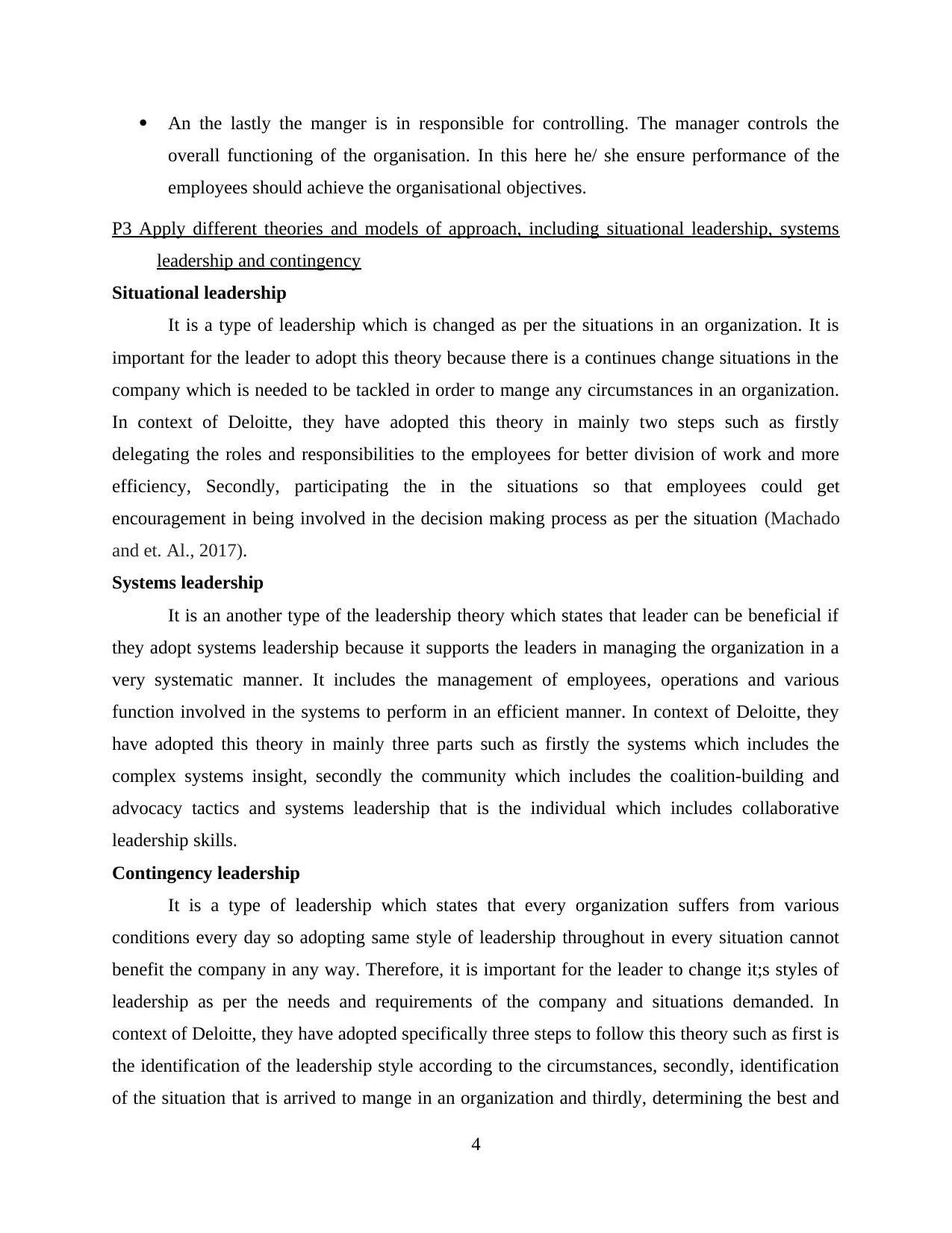
An the lastly the manger is in responsible for controlling. The manager controls the
overall functioning of the organisation. In this here he/ she ensure performance of the
employees should achieve the organisational objectives.
P3 Apply different theories and models of approach, including situational leadership, systems
leadership and contingency
Situational leadership
It is a type of leadership which is changed as per the situations in an organization. It is
important for the leader to adopt this theory because there is a continues change situations in the
company which is needed to be tackled in order to mange any circumstances in an organization.
In context of Deloitte, they have adopted this theory in mainly two steps such as firstly
delegating the roles and responsibilities to the employees for better division of work and more
efficiency, Secondly, participating the in the situations so that employees could get
encouragement in being involved in the decision making process as per the situation (Machado
and et. Al., 2017).
Systems leadership
It is an another type of the leadership theory which states that leader can be beneficial if
they adopt systems leadership because it supports the leaders in managing the organization in a
very systematic manner. It includes the management of employees, operations and various
function involved in the systems to perform in an efficient manner. In context of Deloitte, they
have adopted this theory in mainly three parts such as firstly the systems which includes the
complex systems insight, secondly the community which includes the coalition-building and
advocacy tactics and systems leadership that is the individual which includes collaborative
leadership skills.
Contingency leadership
It is a type of leadership which states that every organization suffers from various
conditions every day so adopting same style of leadership throughout in every situation cannot
benefit the company in any way. Therefore, it is important for the leader to change it;s styles of
leadership as per the needs and requirements of the company and situations demanded. In
context of Deloitte, they have adopted specifically three steps to follow this theory such as first is
the identification of the leadership style according to the circumstances, secondly, identification
of the situation that is arrived to mange in an organization and thirdly, determining the best and
4
overall functioning of the organisation. In this here he/ she ensure performance of the
employees should achieve the organisational objectives.
P3 Apply different theories and models of approach, including situational leadership, systems
leadership and contingency
Situational leadership
It is a type of leadership which is changed as per the situations in an organization. It is
important for the leader to adopt this theory because there is a continues change situations in the
company which is needed to be tackled in order to mange any circumstances in an organization.
In context of Deloitte, they have adopted this theory in mainly two steps such as firstly
delegating the roles and responsibilities to the employees for better division of work and more
efficiency, Secondly, participating the in the situations so that employees could get
encouragement in being involved in the decision making process as per the situation (Machado
and et. Al., 2017).
Systems leadership
It is an another type of the leadership theory which states that leader can be beneficial if
they adopt systems leadership because it supports the leaders in managing the organization in a
very systematic manner. It includes the management of employees, operations and various
function involved in the systems to perform in an efficient manner. In context of Deloitte, they
have adopted this theory in mainly three parts such as firstly the systems which includes the
complex systems insight, secondly the community which includes the coalition-building and
advocacy tactics and systems leadership that is the individual which includes collaborative
leadership skills.
Contingency leadership
It is a type of leadership which states that every organization suffers from various
conditions every day so adopting same style of leadership throughout in every situation cannot
benefit the company in any way. Therefore, it is important for the leader to change it;s styles of
leadership as per the needs and requirements of the company and situations demanded. In
context of Deloitte, they have adopted specifically three steps to follow this theory such as first is
the identification of the leadership style according to the circumstances, secondly, identification
of the situation that is arrived to mange in an organization and thirdly, determining the best and
4
Paraphrase This Document
Need a fresh take? Get an instant paraphrase of this document with our AI Paraphraser
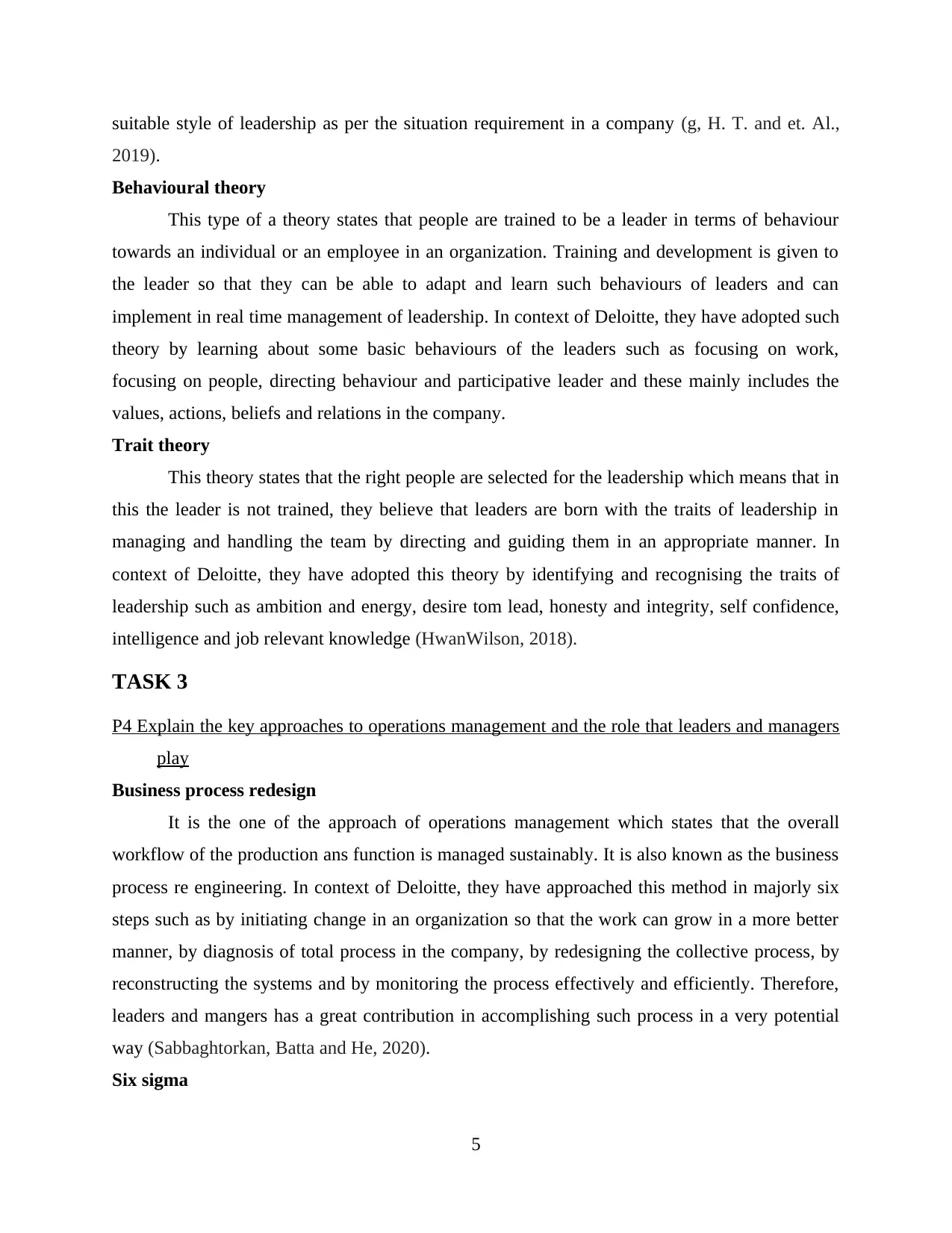
suitable style of leadership as per the situation requirement in a company (g, H. T. and et. Al.,
2019).
Behavioural theory
This type of a theory states that people are trained to be a leader in terms of behaviour
towards an individual or an employee in an organization. Training and development is given to
the leader so that they can be able to adapt and learn such behaviours of leaders and can
implement in real time management of leadership. In context of Deloitte, they have adopted such
theory by learning about some basic behaviours of the leaders such as focusing on work,
focusing on people, directing behaviour and participative leader and these mainly includes the
values, actions, beliefs and relations in the company.
Trait theory
This theory states that the right people are selected for the leadership which means that in
this the leader is not trained, they believe that leaders are born with the traits of leadership in
managing and handling the team by directing and guiding them in an appropriate manner. In
context of Deloitte, they have adopted this theory by identifying and recognising the traits of
leadership such as ambition and energy, desire tom lead, honesty and integrity, self confidence,
intelligence and job relevant knowledge (HwanWilson, 2018).
TASK 3
P4 Explain the key approaches to operations management and the role that leaders and managers
play
Business process redesign
It is the one of the approach of operations management which states that the overall
workflow of the production ans function is managed sustainably. It is also known as the business
process re engineering. In context of Deloitte, they have approached this method in majorly six
steps such as by initiating change in an organization so that the work can grow in a more better
manner, by diagnosis of total process in the company, by redesigning the collective process, by
reconstructing the systems and by monitoring the process effectively and efficiently. Therefore,
leaders and mangers has a great contribution in accomplishing such process in a very potential
way (Sabbaghtorkan, Batta and He, 2020).
Six sigma
5
2019).
Behavioural theory
This type of a theory states that people are trained to be a leader in terms of behaviour
towards an individual or an employee in an organization. Training and development is given to
the leader so that they can be able to adapt and learn such behaviours of leaders and can
implement in real time management of leadership. In context of Deloitte, they have adopted such
theory by learning about some basic behaviours of the leaders such as focusing on work,
focusing on people, directing behaviour and participative leader and these mainly includes the
values, actions, beliefs and relations in the company.
Trait theory
This theory states that the right people are selected for the leadership which means that in
this the leader is not trained, they believe that leaders are born with the traits of leadership in
managing and handling the team by directing and guiding them in an appropriate manner. In
context of Deloitte, they have adopted this theory by identifying and recognising the traits of
leadership such as ambition and energy, desire tom lead, honesty and integrity, self confidence,
intelligence and job relevant knowledge (HwanWilson, 2018).
TASK 3
P4 Explain the key approaches to operations management and the role that leaders and managers
play
Business process redesign
It is the one of the approach of operations management which states that the overall
workflow of the production ans function is managed sustainably. It is also known as the business
process re engineering. In context of Deloitte, they have approached this method in majorly six
steps such as by initiating change in an organization so that the work can grow in a more better
manner, by diagnosis of total process in the company, by redesigning the collective process, by
reconstructing the systems and by monitoring the process effectively and efficiently. Therefore,
leaders and mangers has a great contribution in accomplishing such process in a very potential
way (Sabbaghtorkan, Batta and He, 2020).
Six sigma
5
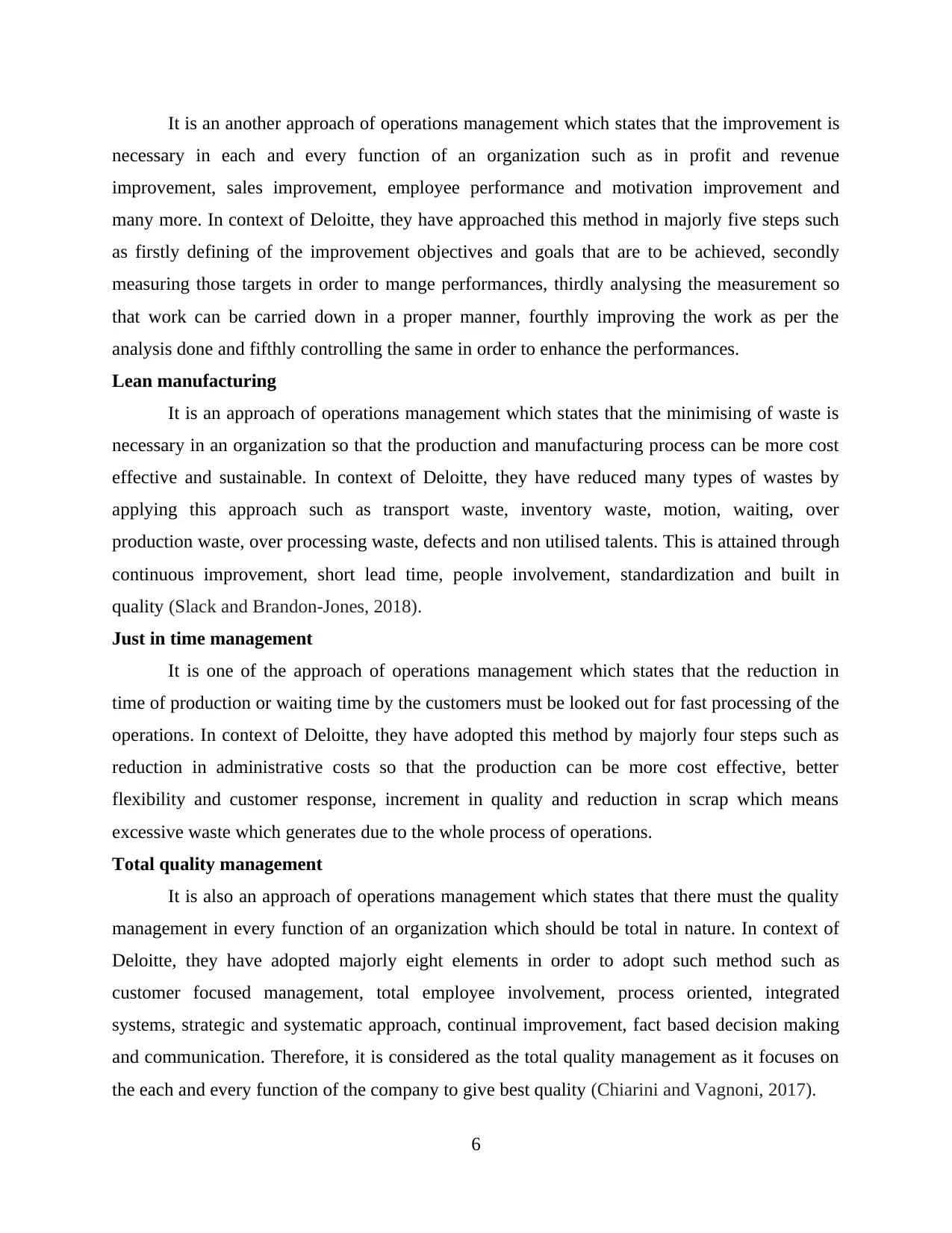
It is an another approach of operations management which states that the improvement is
necessary in each and every function of an organization such as in profit and revenue
improvement, sales improvement, employee performance and motivation improvement and
many more. In context of Deloitte, they have approached this method in majorly five steps such
as firstly defining of the improvement objectives and goals that are to be achieved, secondly
measuring those targets in order to mange performances, thirdly analysing the measurement so
that work can be carried down in a proper manner, fourthly improving the work as per the
analysis done and fifthly controlling the same in order to enhance the performances.
Lean manufacturing
It is an approach of operations management which states that the minimising of waste is
necessary in an organization so that the production and manufacturing process can be more cost
effective and sustainable. In context of Deloitte, they have reduced many types of wastes by
applying this approach such as transport waste, inventory waste, motion, waiting, over
production waste, over processing waste, defects and non utilised talents. This is attained through
continuous improvement, short lead time, people involvement, standardization and built in
quality (Slack and Brandon-Jones, 2018).
Just in time management
It is one of the approach of operations management which states that the reduction in
time of production or waiting time by the customers must be looked out for fast processing of the
operations. In context of Deloitte, they have adopted this method by majorly four steps such as
reduction in administrative costs so that the production can be more cost effective, better
flexibility and customer response, increment in quality and reduction in scrap which means
excessive waste which generates due to the whole process of operations.
Total quality management
It is also an approach of operations management which states that there must the quality
management in every function of an organization which should be total in nature. In context of
Deloitte, they have adopted majorly eight elements in order to adopt such method such as
customer focused management, total employee involvement, process oriented, integrated
systems, strategic and systematic approach, continual improvement, fact based decision making
and communication. Therefore, it is considered as the total quality management as it focuses on
the each and every function of the company to give best quality (Chiarini and Vagnoni, 2017).
6
necessary in each and every function of an organization such as in profit and revenue
improvement, sales improvement, employee performance and motivation improvement and
many more. In context of Deloitte, they have approached this method in majorly five steps such
as firstly defining of the improvement objectives and goals that are to be achieved, secondly
measuring those targets in order to mange performances, thirdly analysing the measurement so
that work can be carried down in a proper manner, fourthly improving the work as per the
analysis done and fifthly controlling the same in order to enhance the performances.
Lean manufacturing
It is an approach of operations management which states that the minimising of waste is
necessary in an organization so that the production and manufacturing process can be more cost
effective and sustainable. In context of Deloitte, they have reduced many types of wastes by
applying this approach such as transport waste, inventory waste, motion, waiting, over
production waste, over processing waste, defects and non utilised talents. This is attained through
continuous improvement, short lead time, people involvement, standardization and built in
quality (Slack and Brandon-Jones, 2018).
Just in time management
It is one of the approach of operations management which states that the reduction in
time of production or waiting time by the customers must be looked out for fast processing of the
operations. In context of Deloitte, they have adopted this method by majorly four steps such as
reduction in administrative costs so that the production can be more cost effective, better
flexibility and customer response, increment in quality and reduction in scrap which means
excessive waste which generates due to the whole process of operations.
Total quality management
It is also an approach of operations management which states that there must the quality
management in every function of an organization which should be total in nature. In context of
Deloitte, they have adopted majorly eight elements in order to adopt such method such as
customer focused management, total employee involvement, process oriented, integrated
systems, strategic and systematic approach, continual improvement, fact based decision making
and communication. Therefore, it is considered as the total quality management as it focuses on
the each and every function of the company to give best quality (Chiarini and Vagnoni, 2017).
6
⊘ This is a preview!⊘
Do you want full access?
Subscribe today to unlock all pages.

Trusted by 1+ million students worldwide
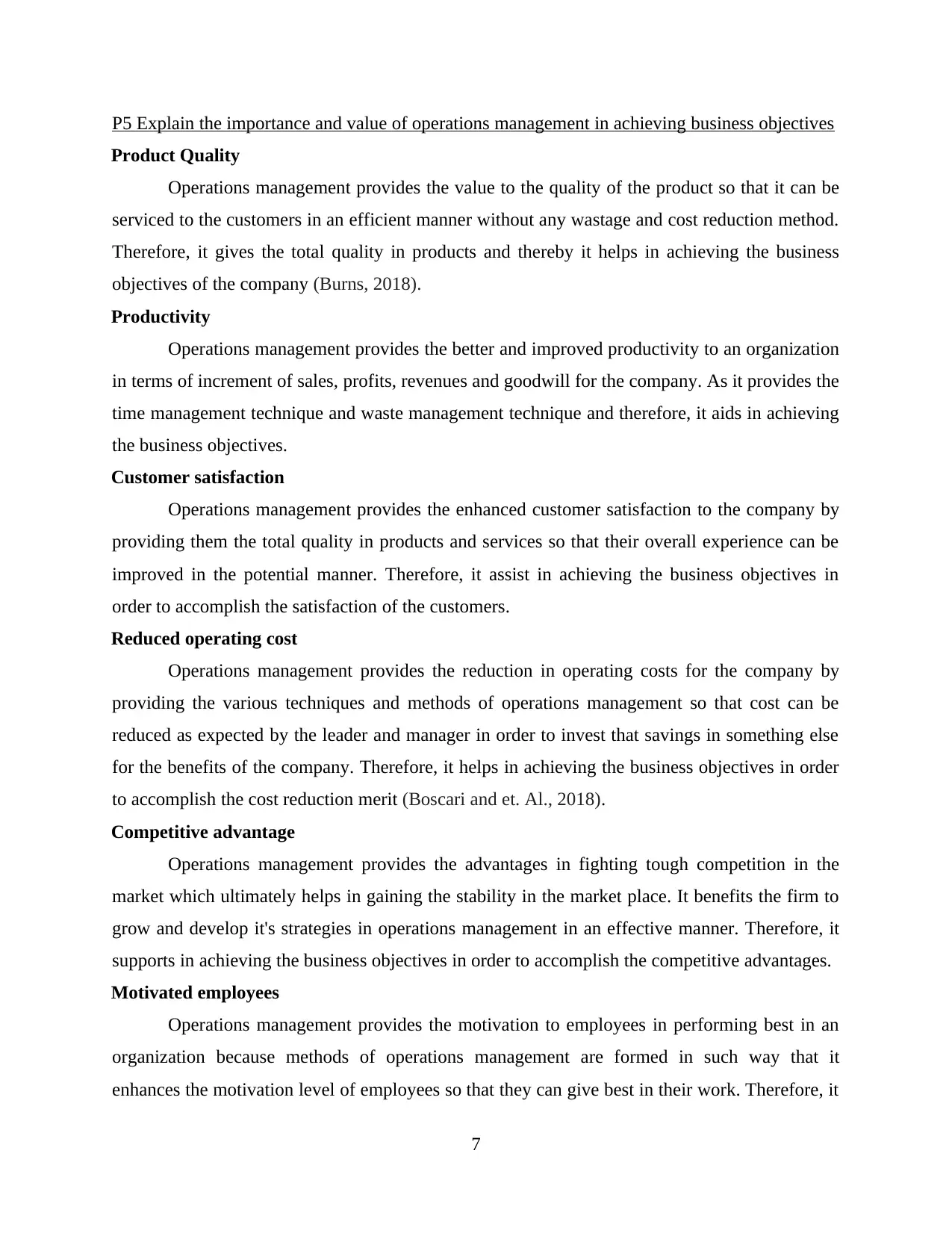
P5 Explain the importance and value of operations management in achieving business objectives
Product Quality
Operations management provides the value to the quality of the product so that it can be
serviced to the customers in an efficient manner without any wastage and cost reduction method.
Therefore, it gives the total quality in products and thereby it helps in achieving the business
objectives of the company (Burns, 2018).
Productivity
Operations management provides the better and improved productivity to an organization
in terms of increment of sales, profits, revenues and goodwill for the company. As it provides the
time management technique and waste management technique and therefore, it aids in achieving
the business objectives.
Customer satisfaction
Operations management provides the enhanced customer satisfaction to the company by
providing them the total quality in products and services so that their overall experience can be
improved in the potential manner. Therefore, it assist in achieving the business objectives in
order to accomplish the satisfaction of the customers.
Reduced operating cost
Operations management provides the reduction in operating costs for the company by
providing the various techniques and methods of operations management so that cost can be
reduced as expected by the leader and manager in order to invest that savings in something else
for the benefits of the company. Therefore, it helps in achieving the business objectives in order
to accomplish the cost reduction merit (Boscari and et. Al., 2018).
Competitive advantage
Operations management provides the advantages in fighting tough competition in the
market which ultimately helps in gaining the stability in the market place. It benefits the firm to
grow and develop it's strategies in operations management in an effective manner. Therefore, it
supports in achieving the business objectives in order to accomplish the competitive advantages.
Motivated employees
Operations management provides the motivation to employees in performing best in an
organization because methods of operations management are formed in such way that it
enhances the motivation level of employees so that they can give best in their work. Therefore, it
7
Product Quality
Operations management provides the value to the quality of the product so that it can be
serviced to the customers in an efficient manner without any wastage and cost reduction method.
Therefore, it gives the total quality in products and thereby it helps in achieving the business
objectives of the company (Burns, 2018).
Productivity
Operations management provides the better and improved productivity to an organization
in terms of increment of sales, profits, revenues and goodwill for the company. As it provides the
time management technique and waste management technique and therefore, it aids in achieving
the business objectives.
Customer satisfaction
Operations management provides the enhanced customer satisfaction to the company by
providing them the total quality in products and services so that their overall experience can be
improved in the potential manner. Therefore, it assist in achieving the business objectives in
order to accomplish the satisfaction of the customers.
Reduced operating cost
Operations management provides the reduction in operating costs for the company by
providing the various techniques and methods of operations management so that cost can be
reduced as expected by the leader and manager in order to invest that savings in something else
for the benefits of the company. Therefore, it helps in achieving the business objectives in order
to accomplish the cost reduction merit (Boscari and et. Al., 2018).
Competitive advantage
Operations management provides the advantages in fighting tough competition in the
market which ultimately helps in gaining the stability in the market place. It benefits the firm to
grow and develop it's strategies in operations management in an effective manner. Therefore, it
supports in achieving the business objectives in order to accomplish the competitive advantages.
Motivated employees
Operations management provides the motivation to employees in performing best in an
organization because methods of operations management are formed in such way that it
enhances the motivation level of employees so that they can give best in their work. Therefore, it
7
Paraphrase This Document
Need a fresh take? Get an instant paraphrase of this document with our AI Paraphraser
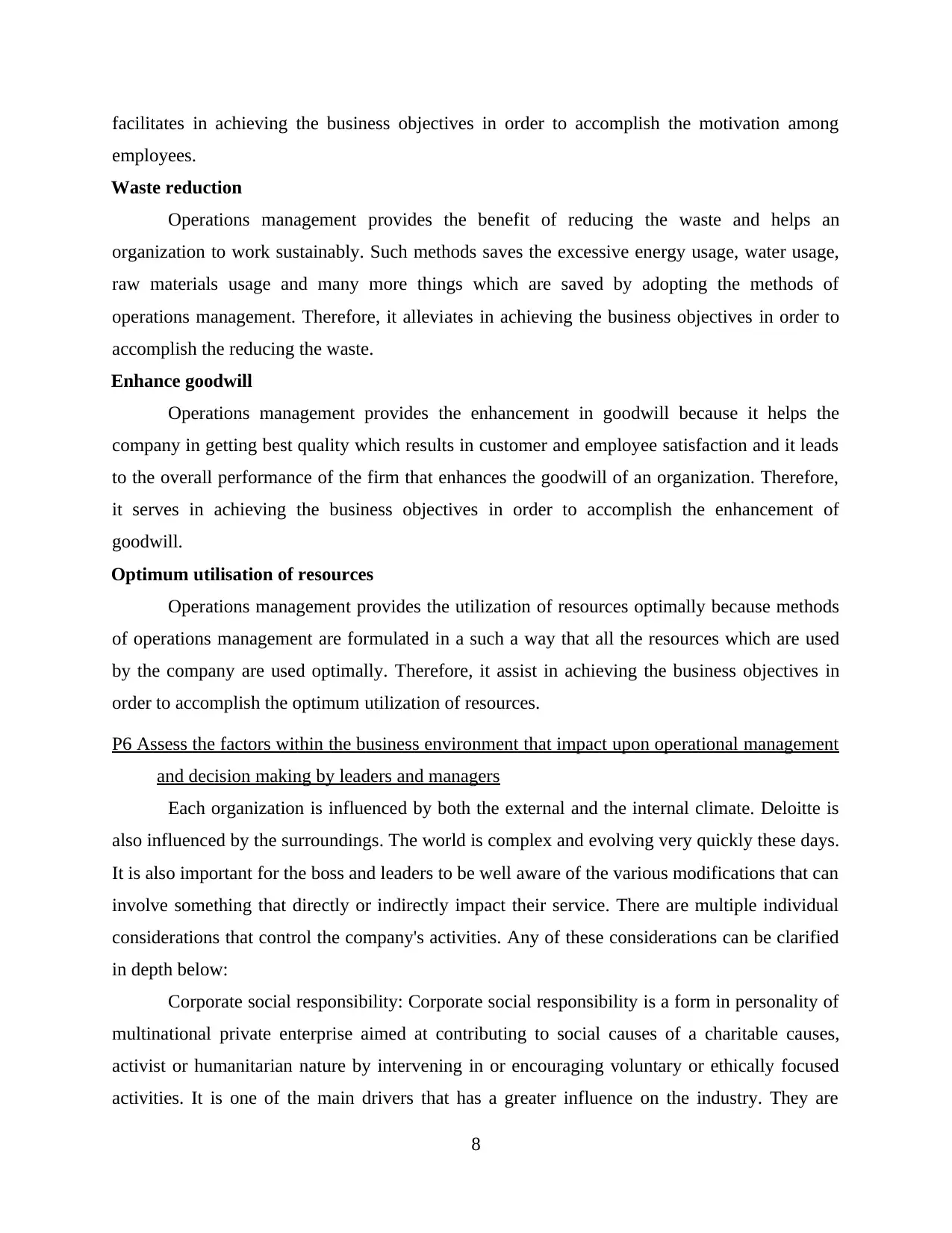
facilitates in achieving the business objectives in order to accomplish the motivation among
employees.
Waste reduction
Operations management provides the benefit of reducing the waste and helps an
organization to work sustainably. Such methods saves the excessive energy usage, water usage,
raw materials usage and many more things which are saved by adopting the methods of
operations management. Therefore, it alleviates in achieving the business objectives in order to
accomplish the reducing the waste.
Enhance goodwill
Operations management provides the enhancement in goodwill because it helps the
company in getting best quality which results in customer and employee satisfaction and it leads
to the overall performance of the firm that enhances the goodwill of an organization. Therefore,
it serves in achieving the business objectives in order to accomplish the enhancement of
goodwill.
Optimum utilisation of resources
Operations management provides the utilization of resources optimally because methods
of operations management are formulated in a such a way that all the resources which are used
by the company are used optimally. Therefore, it assist in achieving the business objectives in
order to accomplish the optimum utilization of resources.
P6 Assess the factors within the business environment that impact upon operational management
and decision making by leaders and managers
Each organization is influenced by both the external and the internal climate. Deloitte is
also influenced by the surroundings. The world is complex and evolving very quickly these days.
It is also important for the boss and leaders to be well aware of the various modifications that can
involve something that directly or indirectly impact their service. There are multiple individual
considerations that control the company's activities. Any of these considerations can be clarified
in depth below:
Corporate social responsibility: Corporate social responsibility is a form in personality of
multinational private enterprise aimed at contributing to social causes of a charitable causes,
activist or humanitarian nature by intervening in or encouraging voluntary or ethically focused
activities. It is one of the main drivers that has a greater influence on the industry. They are
8
employees.
Waste reduction
Operations management provides the benefit of reducing the waste and helps an
organization to work sustainably. Such methods saves the excessive energy usage, water usage,
raw materials usage and many more things which are saved by adopting the methods of
operations management. Therefore, it alleviates in achieving the business objectives in order to
accomplish the reducing the waste.
Enhance goodwill
Operations management provides the enhancement in goodwill because it helps the
company in getting best quality which results in customer and employee satisfaction and it leads
to the overall performance of the firm that enhances the goodwill of an organization. Therefore,
it serves in achieving the business objectives in order to accomplish the enhancement of
goodwill.
Optimum utilisation of resources
Operations management provides the utilization of resources optimally because methods
of operations management are formulated in a such a way that all the resources which are used
by the company are used optimally. Therefore, it assist in achieving the business objectives in
order to accomplish the optimum utilization of resources.
P6 Assess the factors within the business environment that impact upon operational management
and decision making by leaders and managers
Each organization is influenced by both the external and the internal climate. Deloitte is
also influenced by the surroundings. The world is complex and evolving very quickly these days.
It is also important for the boss and leaders to be well aware of the various modifications that can
involve something that directly or indirectly impact their service. There are multiple individual
considerations that control the company's activities. Any of these considerations can be clarified
in depth below:
Corporate social responsibility: Corporate social responsibility is a form in personality of
multinational private enterprise aimed at contributing to social causes of a charitable causes,
activist or humanitarian nature by intervening in or encouraging voluntary or ethically focused
activities. It is one of the main drivers that has a greater influence on the industry. They are
8
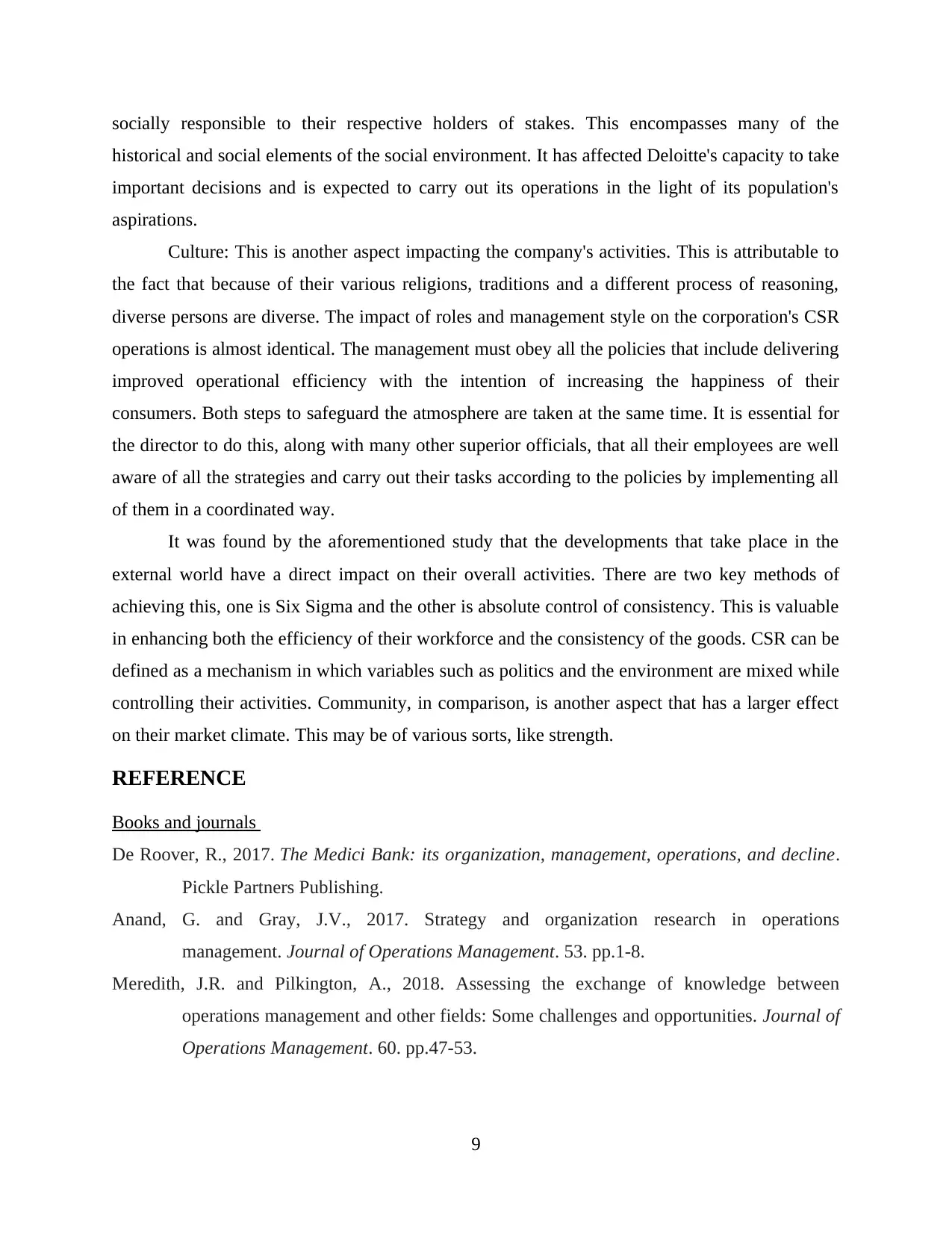
socially responsible to their respective holders of stakes. This encompasses many of the
historical and social elements of the social environment. It has affected Deloitte's capacity to take
important decisions and is expected to carry out its operations in the light of its population's
aspirations.
Culture: This is another aspect impacting the company's activities. This is attributable to
the fact that because of their various religions, traditions and a different process of reasoning,
diverse persons are diverse. The impact of roles and management style on the corporation's CSR
operations is almost identical. The management must obey all the policies that include delivering
improved operational efficiency with the intention of increasing the happiness of their
consumers. Both steps to safeguard the atmosphere are taken at the same time. It is essential for
the director to do this, along with many other superior officials, that all their employees are well
aware of all the strategies and carry out their tasks according to the policies by implementing all
of them in a coordinated way.
It was found by the aforementioned study that the developments that take place in the
external world have a direct impact on their overall activities. There are two key methods of
achieving this, one is Six Sigma and the other is absolute control of consistency. This is valuable
in enhancing both the efficiency of their workforce and the consistency of the goods. CSR can be
defined as a mechanism in which variables such as politics and the environment are mixed while
controlling their activities. Community, in comparison, is another aspect that has a larger effect
on their market climate. This may be of various sorts, like strength.
REFERENCE
Books and journals
De Roover, R., 2017. The Medici Bank: its organization, management, operations, and decline.
Pickle Partners Publishing.
Anand, G. and Gray, J.V., 2017. Strategy and organization research in operations
management. Journal of Operations Management. 53. pp.1-8.
Meredith, J.R. and Pilkington, A., 2018. Assessing the exchange of knowledge between
operations management and other fields: Some challenges and opportunities. Journal of
Operations Management. 60. pp.47-53.
9
historical and social elements of the social environment. It has affected Deloitte's capacity to take
important decisions and is expected to carry out its operations in the light of its population's
aspirations.
Culture: This is another aspect impacting the company's activities. This is attributable to
the fact that because of their various religions, traditions and a different process of reasoning,
diverse persons are diverse. The impact of roles and management style on the corporation's CSR
operations is almost identical. The management must obey all the policies that include delivering
improved operational efficiency with the intention of increasing the happiness of their
consumers. Both steps to safeguard the atmosphere are taken at the same time. It is essential for
the director to do this, along with many other superior officials, that all their employees are well
aware of all the strategies and carry out their tasks according to the policies by implementing all
of them in a coordinated way.
It was found by the aforementioned study that the developments that take place in the
external world have a direct impact on their overall activities. There are two key methods of
achieving this, one is Six Sigma and the other is absolute control of consistency. This is valuable
in enhancing both the efficiency of their workforce and the consistency of the goods. CSR can be
defined as a mechanism in which variables such as politics and the environment are mixed while
controlling their activities. Community, in comparison, is another aspect that has a larger effect
on their market climate. This may be of various sorts, like strength.
REFERENCE
Books and journals
De Roover, R., 2017. The Medici Bank: its organization, management, operations, and decline.
Pickle Partners Publishing.
Anand, G. and Gray, J.V., 2017. Strategy and organization research in operations
management. Journal of Operations Management. 53. pp.1-8.
Meredith, J.R. and Pilkington, A., 2018. Assessing the exchange of knowledge between
operations management and other fields: Some challenges and opportunities. Journal of
Operations Management. 60. pp.47-53.
9
⊘ This is a preview!⊘
Do you want full access?
Subscribe today to unlock all pages.

Trusted by 1+ million students worldwide
1 out of 13
Related Documents
Your All-in-One AI-Powered Toolkit for Academic Success.
+13062052269
info@desklib.com
Available 24*7 on WhatsApp / Email
![[object Object]](/_next/static/media/star-bottom.7253800d.svg)
Unlock your academic potential
Copyright © 2020–2026 A2Z Services. All Rights Reserved. Developed and managed by ZUCOL.




